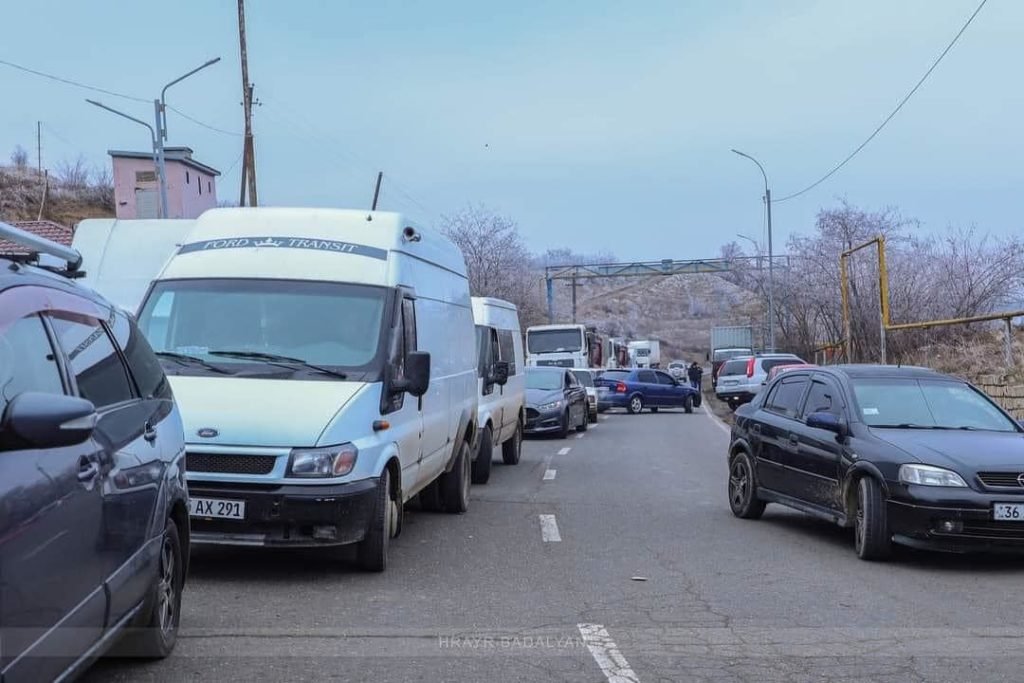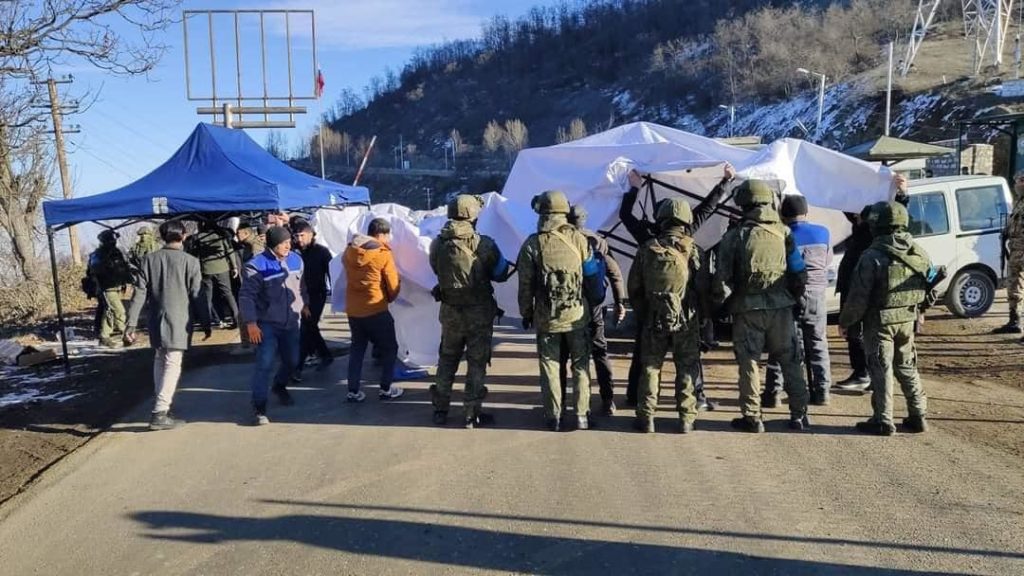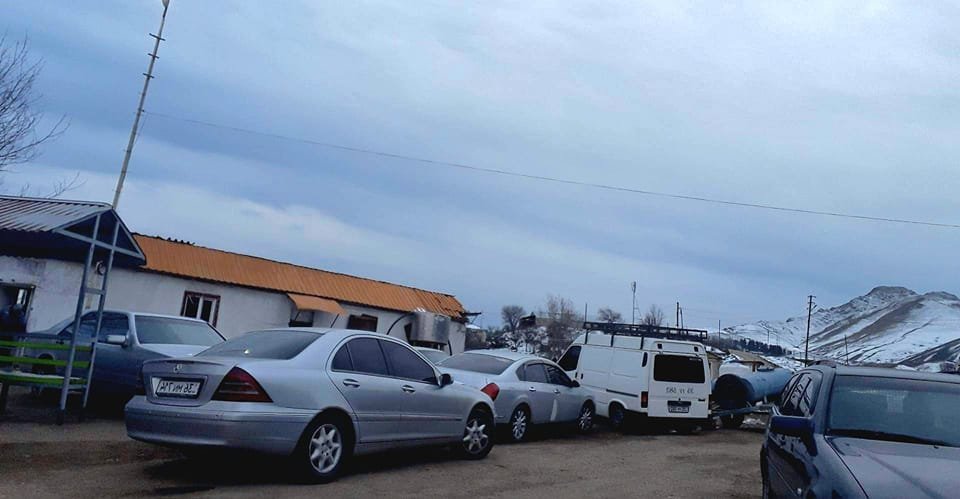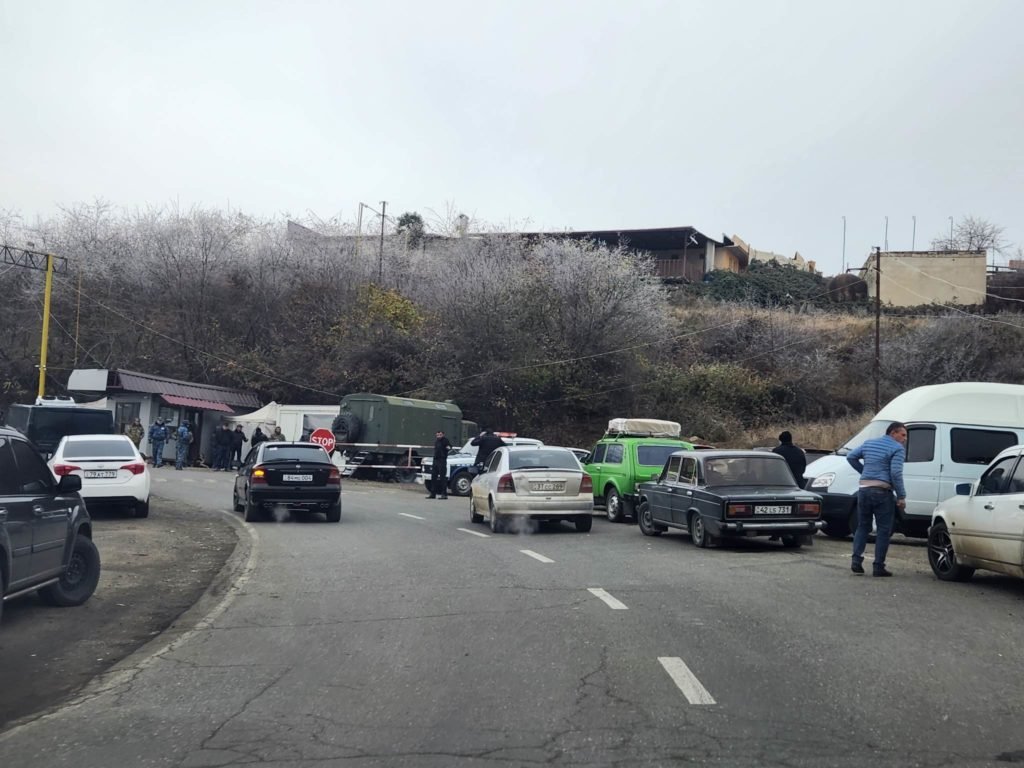
Azerbaijan’s closure of the Berdzor (Lachin) corridor continues, leaving travelers on the road stranded and preventing access to food, gas and medical services for the Armenian residents of Artsakh.
“Artsakh needs all of us. For more than two days, Azerbaijan has kept the 120,000 Armenians of Artsakh under blockade, including my family. We must each do whatever is possible to defend Artsakh and eliminate the risk of genocide,” advisor to the Artsakh State Minister Artak Beglaryan said in a video address on Wednesday.
A group of Azerbaijanis posing as environmental activists have pitched tents along the Stepanakert-Goris highway since the morning of December 12, shutting down the sole route connecting Artsakh with Armenia and the rest of the world. Since the evening of December 13, the only gas pipeline to Artsakh has also been cut off, leaving residents without heating in freezing temperatures.

The activists say that they are demanding a meeting with Andrey Volkov, the head of the Russian peacekeeping force deployed in Artsakh, to discuss the ecological damages of mining in the region. However, the protesters appear driven by nationalist rather than environmental concerns. The hundreds of protesters blocking the Stepanakert-Goris road have been chanting slogans including “Karabakh is Azerbaijan,” “The greatest soldier is our soldier” and “Martyrs are immortal, our land is indivisible.”
Many of the protesters have been seen making the hand gesture of the Grey Wolves, a Turkish nationalist party. One activist told Azerbaijani media that the tents were set up by Azerbaijan’s Ministry of Ecology and Natural Resources.
Eye contact activities for adults.
Artsakh Police reports that hundreds of citizens, including minors cannot return home, some of them temporarily stayed in Syunik, Armenia.
The only road connecting Artsakh to the world has been closed for 13 hours, the news release reads. pic.twitter.com/ALVz9HGwZN
— Marut Vanyan (@marutvanian) December 12, 2022
At least 1,100 civilians traveling between Armenia and Artsakh have been stranded along the blocked highway for the past three days. Some have spent several nights in Goris, a town in southern Armenia, while others have taken refuge in the Berdadzor region of Artsakh. On Wednesday, Artsakh authorities said that they have provided temporary housing in Goris and Stepanakert, the capital of Artsakh, to 100 passengers stuck on the road.
The road closure has also prevented the transportation of essential economic and medical goods and services. About 400 tons of food and other basic goods are delivered to Artsakh every day from Armenia along the Lachin corridor, according to Artsakh’s Ombudsman Gegham Stepanyan. It has also been impossible to transfer patients awaiting hospitalization in medical centers in Armenia.
“The blockade of Artsakh is not an isolated episode but must be seen as part of the widespread and systematic policy of Azerbaijan aimed at the complete expulsion of the people of Artsakh from their native land,” Stepanyan said.

The single natural gas pipeline that transports Artsakh’s energy supply from Armenia has been shut off since Tuesday evening, leaving Artsakh residents without heating or hot water. The pipeline crosses through the Berdzor (Lachin) district, which came under Azerbaijani control after the 2020 Artsakh War.
Artsakh authorities have instituted a fuel rationing system in response to the gas shortage. Ambulances, public transportation, and security and emergency service vehicles will receive priority at gas stations. Classes have also been temporarily suspended, as schools heated with gas have been closed.
Gas supply to Artsakh was previously shut off for three weeks in March 2021. Artsakh authorities said that the Azerbaijani side prohibited Armenian sapper groups from accessing the pipeline after it was damaged.
Artsakh President Arayik Harutyunyan declared a state of martial law on Wednesday evening in response to the ongoing crisis, restricting freedom of movement and assembly within the region. He also appointed Artsakh State Minister Ruben Vardanyan the head of an operational headquarters that will be open 24 hours a day to resolve issues arising from the road closure.
On Wednesday, Beglaryan started an indefinite sit-in protest in front of the United Nations office in Yerevan, to demand that the UN condemn Azerbaijan’s blockade of Artsakh and provide security guarantees for its population. He is also calling on the Armenian diaspora to organize protests in their own cities and public awareness campaigns in the media.

This is the second time in two weeks that Azerbaijanis have closed the Stepanakert-Goris highway. On December 3, a group of state representatives from Azerbaijan shut down the highway for nearly four hours. Azerbaijani authorities said that government employees traveled toward Shushi from Stepanakert to address “environmental damage” arising from “illegal exploitation of minerals” in Artsakh.
The Ministry of Foreign Affairs of Azerbaijan said that the protesters mobilized after government representatives were prevented from visiting mines in the Martakert region of Artsakh on December 10. Members of the Azerbaijan Ministry of Ecology and Natural Resources, the Ministry of Economy and AzerGold met with Russian peacekeepers on December 3 and 7 to discuss monitoring “illegal exploitation of minerals” in Artsakh. The group said it received permission from the peacekeeping force for a one-time observation mission on December 10.
However, the delegation was prohibited from visiting the mines by the employees of the mining companies and Armenian residents of the region. Artsakh leadership said the “suggested program was not agreed upon with the authorities of the Artsakh Republic.”
The Azerbaijani Foreign Ministry said that the protest is the “result of rightful dissatisfaction of the Azerbaijani public with illegal economic activity” and “damage to the environment.”
“The Azerbaijani side is ready to meet the humanitarian needs of all Armenian residents living in our territories,” the Foreign Ministry said in a December 13 statement.
The Foreign Ministry denied that Azerbaijan had shut down the Lachin corridor, stating that the highway had been closed by Russian peacekeepers. However, in their daily bulletin, the peacekeeping mission said that the road had been closed by the Azerbaijani side.
Several Azerbaijani commentators have been explicit that the purpose of the protests is not ecological.
They are satisfied that Armenian children can’t return home, Artsakh/Karabakh.
“We appeal to our compatriots in Armenia/Diaspora to use all opportunities to stop humanitarian disaster created by Azerbaijan, to stand up for the protection of the rights of Artsakh people”. NA pic.twitter.com/pMzbJ8pmnz
— Marut Vanyan (@marutvanian) December 13, 2022
“It would be naïve to believe that what has happened in recent times is only due to ‘environmental concerns,’” Azerbaijani researcher Shujaat Ahmadzada tweeted. Rather, Ahmadzada said Azerbaijan is “increasing the stakes” to “reach compromises” in ongoing negotiations with Armenia regarding the Artsakh conflict.
Cavid Qara, a prominent Baku-based environmental activist, said that none of the protesters currently blocking the Stepanakert-Goris highway have attended previous environmental demonstrations.
“It is obvious that the protest of ‘eco-activists’ in Karabakh has a false agenda,” Qara wrote on Facebook. “People who do not raise environmental issues in this country have no moral right to protest the enemy’s environmental crimes.”
The Armenian Foreign Ministry called for “international mechanisms for ensuring the rights and security of the Armenians of Nagorno-Karabakh.” It said that the government of Azerbaijan organized the road closure to cut off Artsakh from Armenia and the outside world.
“The blockage of the Lachin Corridor is the practical manifestation of many alarms that Azerbaijan has adopted a policy of genocide against the Armenians of Nagorno-Karabakh,” the Foreign Ministry said in a December 13 statement.
The United States, France and the European Union have called on Azerbaijan to restore freedom of movement along the Lachin corridor.
US State Department spokesperson said that “disruption to energy infrastructure could precipitate a humanitarian crisis, especially as we’re entering the winter months.”
“If deliberate, it’s unacceptable to target the civilian population of Nagorno-Karabakh,” Price said during a press briefing on December 14.
The French Foreign Ministry said that Azerbaijan “pledged to guarantee the safety of people, vehicles and goods traveling along the Lachin corridor, in both directions” under the terms of the ceasefire ending the 2020 Artsakh War. It called for “access and supplies to Nagorno-Karabakh to be unconditionally restored, with due regard for the rights of the population living there,” in a December 14 statement.
The EU also called on Azerbaijan to “ensure freedom and security of movement” along the Lachin corridor. “Restrictions to such freedom of movement cause significant distress to the local population and create humanitarian concerns,” spokesperson for the European External Action Service Peter Stano said in a December 13 statement.



What a nightmare.
Horrific. The Armenians in Artsakh are in mortal danger. And Pashinyan with the support of the West and Russia, will give away the rest of Artsakh to the fascist dictatorship of Azerbaijan, which has a habit of eliminating its own citizens. This is the equivalent of handing Jews to Nazi Germany.
It is odd that the Russian military kills innocent Ukrainian citizens for no apparent reason. Yet here we have Azeri nationalists involved in a hostile act against innocent Armenian civilians which is contrary to the trilateral agreement and they are being “negotiated” with. It seems that Russia values Azeri lives more than Armenian or Ukrainian lives. Seems pretty racist to me.
Without US / European aid it is an exercise in futility.
Ugly realities. Great reporting!
The Russian peacekeepers are preventing the end of Artsakh, which has been continuously inhabited by Armenians for millenia. The peacekeepers are there because of Russian interests, but we should take advantage when our national interests are the same.
Traitor Nikol is on the side of the Turks, along with his Western backers. They forced out the inhabitants of Berdzor, Aghavno, and Nerkin Sus. The disasters will continue as long as Nikol is still in power.
It’s not that simplistic, Aram. For example: [1] I saw one Russian Peacekeeper videoed getting chummy with the Azeri-Turkic thugs, at the Lachin Corridor. The Russian Peacekeeper was caught on video saying this, “Inshallah, Karabakh is Azerbaijan.” [2] Another thing, those Russian Peacekeepers could simply forcibly remove the Azeri’Turkic troublemakers, who block humanitarian aide through the corridor. Such an approach isn’t alien to them.
Hi Laurence,
The Russians are known to want to keep a long-term presence in Artsakh. They don’t want Armenians to leave and they don’t want fighting. They want to keep the status quo. I expect that there are ongoing negotiations between Moscow and Baku about the blockade.
There could be many ethnically non-Russian soldiers among these Russian ‘peacekeepers’ acting the way they do as you explained and that because they may feel or have linguistic, religious or cultural connection with these Azerbaijani state-sponsored hooligans disguised as environmentalists just like there are several Russian-led CSTO member states, which Armenia is also a member, that are supposed to defend the legitimate demands and interests of Armenia but instead they act neutral at best in this regard and in some cases behave and come across as anti-Armenian because they identify themselves with or have secret dealings with artificial Azerbaijan’s Aliyev KGB MAFIA clan. Having said that, I believe the Russian government itself does not want this conflict resolved because if there is any kind of resolution to this conflict between the Armenians and the Azerbaijani criminals would mean that Russian troops stationed there will have no reason and excuse to remain there anymore and would be asked to leave. That is the last thing Russia would want to do now that its troops are back in there after thirty years of absence. I have no doubt that this latest questionable war imposed on the Armenians was in essence a way for the Russians to interfere and reestablish themselves back in the region!
Let’s see now: There’s a slush of petrol-oil across the Country of Azerbaijan, and the Caspian Sea is polluted. Now, Baku, Azerbaijan is complaining, because some Armenians make a living in the mining business. Lachin Corridor “Protesters” making a lot of barking noises again.
This ‘slush’, how large is it exactly? We keep hearing about it daily, but no specifics are ever given.
Armenian people need to move on from the myth that Armenia lost because of Pashinyan apparently selling out in 2020 and had they been closer to Russia they would have prevented Azeri attack on Arktash. The woes Russia has faced in Ukraine loosing many assets to the same type of Turkish drones that Armenia did should put paid to that convenient notion of a stab in the back myth and inflated notion of Russian power,although don’t count them out either. After all the 2016 clashes Armenia close to Russia who was a major supplier to Azerbaijan! was at a disadvantage and the balance of power had worsened since. Believing in myths and falsehoods will only further misfortune. Be realistic! Yes Russian peacekeepers are there for Russian interests and not Armenian as such. Equally US forces are for the interests of the USA where they are stationed.